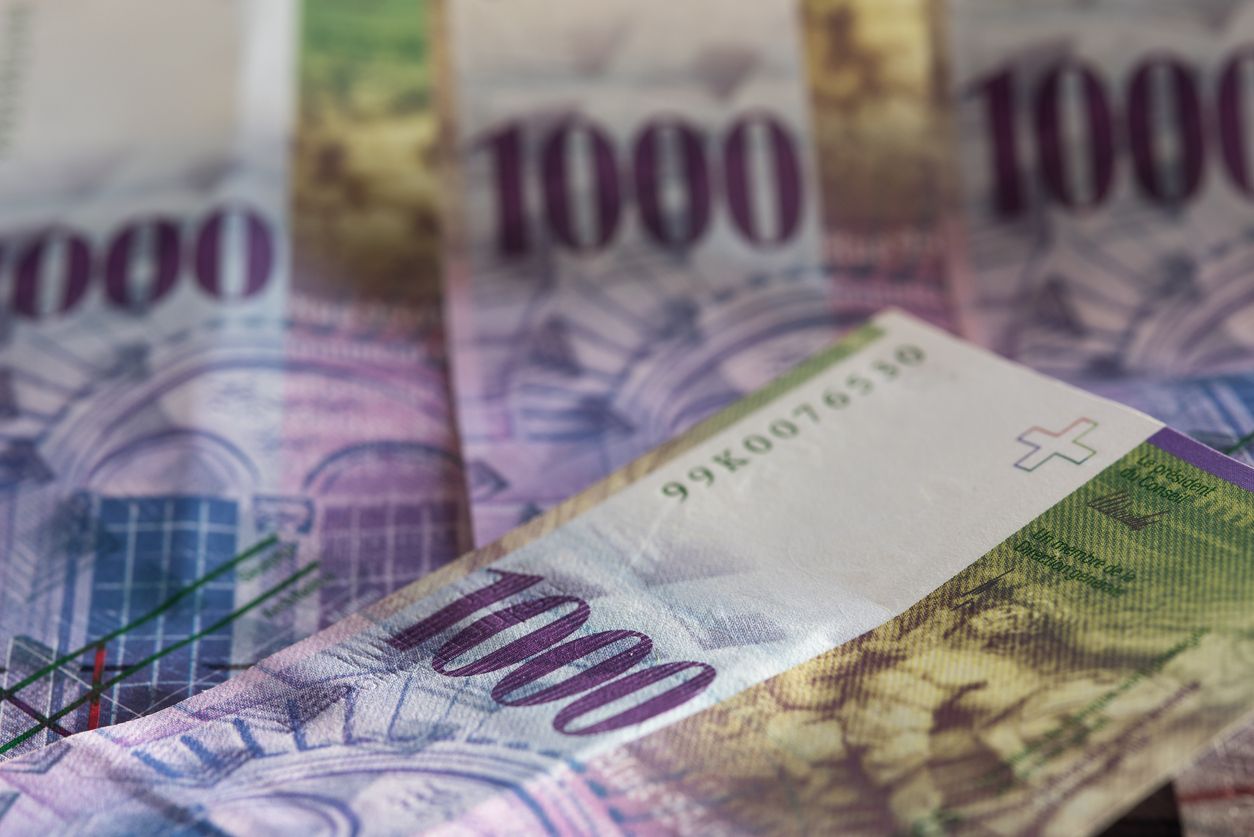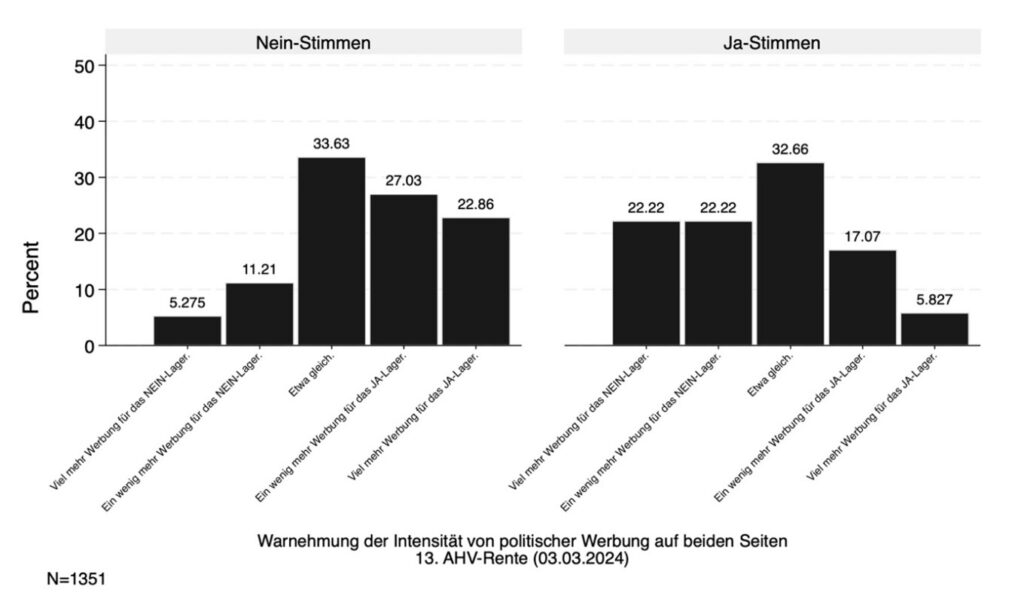
Vote lost – is the higher budget of the opposing side the reason?
Those who spend a lot of money on a referendum campaign are noticed more. However, if we take a closer look at the subjectively perceived intensity of a campaign for yes or no voters, a distortion becomes apparent: the campaign budget of the opposing side is overestimated. Results from a research project conducted by the Centre for Democracy Studies Aarau in collaboration with Année Politique Suisse show how this comes about.
Before referendums, posters and advertisements attempt to convince Swiss citizens to vote yes or no on the proposals. But how do citizens perceive the strength and thus the effectiveness of a referendum campaign on a particular issue? And does this subjective assessment correspond to the objectively measurable advertising expenditure? This is being investigated in an evaluation as part of the research project «Direct Democracy Switzerland in the 21st Century (DDS21)» (see box).
Budget creates effective campaigns
When citizens are asked how effective referendum campaigns are, their assessment corresponds quite closely with the measurable criteria of «advertising expenditure» and «advertisement volume». The authors of the evaluation note: «The assessment of the intensity of the campaigns shortly before the referendums in March and June corresponds to the measurable actual intensity. In both cases, respondents rate the advertising campaigns with the largest budgets and the highest volume of advertisements (13th AHV pension and Electricity Act) as the most intense.»
If you think your opponent has more money
However, if we differentiate between the perceptions of the yes and no camps, a more interesting effect emerges: the overestimation of the opposing side. When citizens are asked whether they believe one side was promoted more strongly than the other, the objective metrics do not correspond as well with subjective perceptions. Those who accepted a proposal generally estimated that the ‘no’ camp had run a more intensive campaign – and vice versa. Their own voting decision thus influenced their perception of how effective the opposing side’s campaign was.
One possible explanation for this effect could be that, from a psychological perspective, the different wording of the content resulted in a different assessment (framing bias). Interestingly, a similar effect occurs regardless of whether a camp wins or loses a vote.
Victim or outsider?
If a person votes yes and the proposal is rejected, respondents attributed this to the perceived financial superiority of the opposing camp. Seeing oneself as a «victim» of the higher budget of the opposing side can be a way of reducing the «stress» of a referendum defeat.

Fig. 1: How is the intensity of political advertising assessed by those voting yes and no on referendum 13 on the 13th AHV pension?
If the proposal is accepted, an outsider effect tends to kick in: even then, supporters (wrongly) assume that the opposing camp had more money at its disposal than their own. Despite the (supposed) campaign superiority of the opposing side, their own vote ultimately prevailed. The satisfaction that this brings is also stress-reducing in terms of «coping».
The authors of the evaluation summarise: «Even though it seems obvious that the intensity of referendum campaigns is important for the outcome of direct democratic decisions, we know surprisingly little about the effect of political advertising on individuals. Our findings suggest that citizens have a good sense of the intensity of political campaigns in general, but that this sense is misleading when it comes to distinguishing between the advertising power of the respective yes and no camps.»
| The project «Direct Democracy Switzerland in the 21st Century (DDS21)» Since 2023, the research project Direct Democracy Switzerland in the 21st Century (DDS21), funded by the Swiss National Science Foundation (SNSF), has been investigating the reasons for Swiss citizens’ participation and voting decisions after each federal referendum. Led by the Centre for Democracy Studies Aarau (CDA), which is affiliated with the University of Zurich, DDS21 brings together members of Switzerland’s eight university political science institutes and the Liechtenstein Institute. The data used in this article comes from surveys conducted after the votes on 3 March 2024 and 9 June 2024, in which more than 1,000 people were asked about their perceptions of the intensity of the voting campaigns for the five proposals: 13th AHV pension, pension initiative, premium relief initiative, electricity law, cost brake initiative, stop compulsory vaccination. Advertising expenditure and the number of advertisements per initiative were compared with the estimated intensity of the campaign. |
Further resources
Blogbeitrag auf der Plattform DeFacto:
German, French, Italian
Project website: https://www.dds21.uzh.ch/de.html
Questions
Prof. Dr. Marc Bühlmann, Director Année Politique Suisse
marc.buehlmann@unibe.ch, 079 354 88 79
Prof. Dr. Isabelle Stadelmann-Steffen, Institut für Politikwissenschaft Bern
isabelle.stadelmann@unibe.ch, 031 684 83 55
Prof. Dr. Daniel Kübler, Center for Democracy Studies Aarau
daniel.kuebler@zda.uzh.ch, 078 815 67 60
About the CDA
The Centre for Democracy Studies Aarau is a scientific research centre supported by the University of Zurich, the University of Applied Sciences and Arts Northwestern Switzerland, the Canton of Aargau and the City of Aarau. It conducts basic research and addresses current issues relating to democracy – regionally, in Switzerland and worldwide. www.zdaarau.ch
About Année Politique Suisse
Since 1965, Année Politique Suisse (APS) has been providing a precise, factual and concise chronicle of developments in Swiss politics and society. We follow political issues from their inception to any referendums and their implementation, report on important social controversies, summarise practical studies and reports, track landmark court rulings, developments in the party landscape and much more. A central concern for us is to embed current events in their historical context, because current events are often merely highlights of lengthy, often repetitive processes that can be traced with APS and placed in a larger context.
APS also provides a wealth of data on Swiss politics (e.g. swissvotes.ch) and participates in various political science research projects focusing on Switzerland. www.anneepolitique.swiss